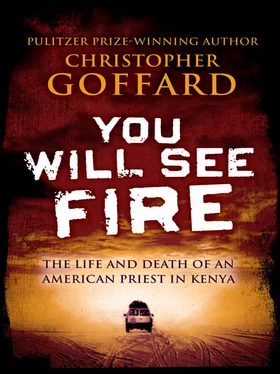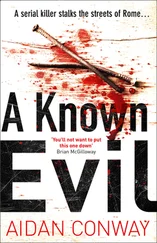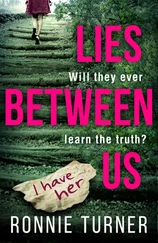The protected villages were dismantled. Samuel Gathenji bought a small plot of land and built a three-room timber-walled home. In their new village there were no guards, no colonial chiefs and subchiefs to answer to, no forced labor, no curfew, no one telling them how to build. The sense of perpetual menace was gone.
Gathenji was fourteen years old on the night in December 1963 when he stood outside Kikuyu Station, the local government headquarters, to watch the Union Jack lowered for the last time; in its place rose the red-and-green-and-black flag of independent Kenya. It was the thirty-fourth African country to achieve independence. The cheering was ecstatic. The tribal songs and dances lasted through the night, and the free food seemed limitless, no small thrill for a scrawny boy who got a single full meal of ugali, a cornmeal porridge, on good days. It was an unalloyed joy to be young in a country that now belonged to its people, with a hero at the helm. It was the last nationalist celebration in which he would be able to lose himself.
Despite his talk of harambee, Kenyatta’s policies would baldly favor his own ethnic base. On well-connected Kikuyus he would lavish prime land, jobs, generous funding, and contracts, with this explanation to those who remonstrated: “ My people have the milk in the morning Конец ознакомительного фрагмента. Текст предоставлен ООО «ЛитРес». Прочитайте эту книгу целиком, купив полную легальную версию на ЛитРес. Безопасно оплатить книгу можно банковской картой Visa, MasterCard, Maestro, со счета мобильного телефона, с платежного терминала, в салоне МТС или Связной, через PayPal, WebMoney, Яндекс.Деньги, QIWI Кошелек, бонусными картами или другим удобным Вам способом.
, your tribes the milk in the afternoon.” As for the years of civil bloodshed, they were to be consigned to the past, banished to the sinkhole of national memory: “ Mau Mau was a disease which had been eradicated Конец ознакомительного фрагмента. Текст предоставлен ООО «ЛитРес». Прочитайте эту книгу целиком, купив полную легальную версию на ЛитРес. Безопасно оплатить книгу можно банковской картой Visa, MasterCard, Maestro, со счета мобильного телефона, с платежного терминала, в салоне МТС или Связной, через PayPal, WebMoney, Яндекс.Деньги, QIWI Кошелек, бонусными картами или другим удобным Вам способом.
, and must never be remembered again.” Yet memory abided, and unhealed traumas lived close to the surface. Former guerillas and former royalists were now living side by side.
Young Gathenji understood there was a price to pay for the perception that his father had been on the wrong side during the independence struggle; he sensed it was the reason behind his eviction from one of the best local schools. Other factors militated against the likelihood that he’d complete his education. For years, he’d been shuttling between schools, forced to leave when money ran out. At night, he studied by the dim light of a paraffin-filled tin can.
He had been nine when his mother died during labor, and he still felt her loss sharply. He remembered her beautiful hair, her impressive height, her Somali profile, and how lovingly she had prepared him and his siblings for school every morning. During canings, she had told him she was beating the sin out of him. As her body was lowered into the grave pit, he felt a strangling in his throat and a numbness in his body. He could neither move nor cry. Staring hard at the sky, he heard one of his sisters wailing. It was his first real experience of loss and helplessness—a feeling that returned a few years later, when his older brother, Henry, was killed crashing his motorcycle. This left Gathenji to shoulder the burdens of the eldest boy. There was always water to be fetched or other chores around the house.
His father remarried and picked up steady work for the government and kept his home immaculate. On weekends, Charles accompanied him on long walks to construction sites, carrying the woven basket that contained the screwdriver and hammer and saw, the red dust rising at their feet as his father sang hymns.
Gathenji began attending an integrated government-run high school in Nairobi. Nobody thought he would go very far. His father disliked the idea of his being alone in the city: There were too many temptations and bad influences for a boy. You’re wasting my money on that school, he told his son, urging him to drop out and train as a flight attendant. The son insisted on staying in school. In the capital, he’d found access to a good library, with shelves of American books. He absorbed tales of Abraham Lincoln and the war for the American West. He read Tom Sawyer and Gone with the Wind. He relished Erle Stanley Gardner’s pulp novels about Perry Mason, the defense attorney who always managed to untangle the web of lies entrapping his clients, and to demonstrate—often by eliciting a courtroom confession—that the government’s version of reality was illusory.
IN JULY 1969, assassins gunned down a young cabinet minister named Tom Mboya on a Nairobi street. He was a prominent member of the Luo, a populous ethnic group whose rivalry with the Kikuyu dominated the country’s politics. Each group spoke a language incomprehensible to the other and looked askance at the other’s rituals (the Kikuyu practiced circumcision, for instance, and the Luo did not). Stereotypes fueled mutual contempt: The Kikuyu were thrusting, greedy, and eager to emulate the West; the Luo were backward and in thrall to atavistic tribal beliefs. The Luo masses, who nursed a sense of bitter exclusion as their rivals came to dominate politics, business, and the civil service, perceived the hand of the Kikuyu elite in the assassination. Street riots and mob skirmishes erupted, crowds hurled stones at Kenyatta’s motorcade, and there were reports that Kikuyus were being murdered.
Gathenji avoided the streets. As the sense of siege became widespread, and as Luo anger threatened to tilt upcoming elections, the Kikuyu resurrected a tactic from the years of insurrection: mass oathing ceremonies. Officially, nothing of the sort was taking place. When church leaders visited Kenyatta to express concern, he feigned ignorance.
But from cities and villages, on foot and by bus and hired truck, thousands made their way to secret ceremonies, some of them at Kenyatta’s own compound, where they affirmed their loyalty to the House of Mumbi—the Kikuyu people—and to Kenyatta himself. It was the year of the American moon landing, and the pilgrimage was called “going to the moon.”
Mercenary motives exacerbated the mania: Fees were demanded of the oath takers. To any number of teachers, government ministers, civil servants, professors, and other intellectuals, the ingestion of goat blood was a meaningless humiliation, the oath a coerced recitation of empty, superstitious words. As in the Mau Mau era, however, those who refused the oath—often on religious grounds—were considered dangerously unreliable, potential turncoats.
One day that September, Charles met his father during a lunch break in the capital’s Uhuru Park, where the elder Gathenji was building the framework for a series of ponds. “People are looking for me,” he told his son. The village headman and the regional parliamentarian had been organizing mass oathing trips; in some cases, gangs had been snatching people from their homes.
Читать дальше












